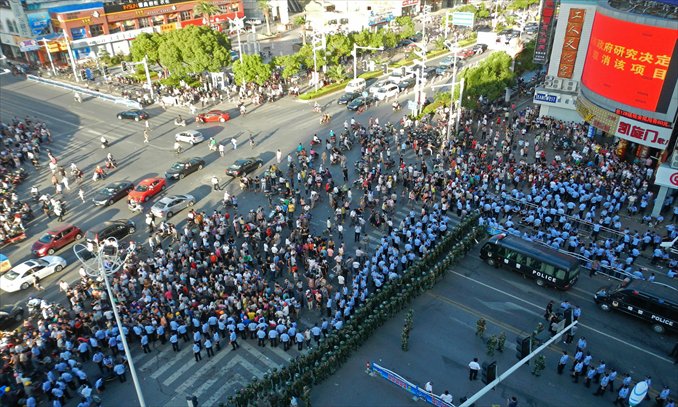Order restored to Qidong after protest

Order was basically restored Sunday on the streets near the government office of Qidong, where thousands of residents gathered and stormed the compound the previous day in protest at a planned pipeline that will channel waste water into the sea for a Japanese paper factory.
The Nantong factory of Oji Paper Group, some 100 kilometers west of Qidong, halted operations Saturday and remained closed Sunday while two police officers and several security guards guarded the gate.
The Japanese company said its Nantong factory will continue to operate, while expressing its concerns with the protest, according to Kyodo News.
A 25-year-old worker at Oji, who identified herself as Wang, told the Global Times that she found the factory closed on Saturday when going to work as usual, and was told that she was expected back at work on Tuesday.
Huang, a spokesman for the general manager's office who defended the company's use of the pipeline in an interview with the Global Times on Thursday, declined to confirm the reopening date Sunday.
The government of Nantong in Jiangsu Province announced on Saturday that the planned waste water pipeline project will be "permanently cancelled."
The announcement came after thousands of protesters rallied at Jianghaizhong Road, where the Qidong government is located, and occupied the government building on Saturday morning.
"Protesters broke into the office building at about 8 am. Shortly after that, the armed police showed up and blocked the street," a 28-year-old witness who asked to be identified as Zhang told the Global Times.
Zhang said that he also saw people clashing with the police and that arrests were made. Vehicles were reportedly overturned.
The Qidong police wrote on its official microblog later on Saturday that rumors about two people being beaten to death were not true.
As people continued to gather at the blocked area on Saturday afternoon, a recorded message from Ding Dawei, secretary of the CPC Nantong Municipal Committee, asked people to disperse as the Nantong government had decided to "permanently stop" the drainage pipeline project.
The government did not disclose further information about how Oji will manage the waste discharge issue after scrapping the pipeline to the port city of Qidong.
The Oji paper project in Jiangsu is said to be one of the largest investments ever made by Japan in China, with a total value of over $1.9 billion. The plant in Nantong was put into production in 2011. The waste water meets China's national standards, according to Oji's official website.
Japanese newspaper Asahi Shimbun said on its Sina Weibo account that Oji currently discharges waste into the Yangtze River.
Ni Hongfen, a taxi driver in Nantong, told the Global Times that he welcomes big companies that help boost the city's economy, but not at the expense of the public's health.
"The government may focus more on the economy, but we ordinary residents would like to live a healthy life first of all," she told the Global Times.
Atsushi Okudera, a Shanghai-stationed journalist from Asahi Shimbun, claimed he was hit in the head and back after local police pushed him to the ground and beat him when he was covering the demonstration on Saturday.
"At least 10 armed police beat and kick me, even though I showed them I was a journalist," Okudera, who is now being treated at a hospital in Shanghai, told the Global Times.
His press ID and digital camera were confiscated by the police and still have not been returned, he said, adding that he is demanding a sincere apology from the local authorities.
The Asahi Shimbun protested against the violent behavior against its correspondent to the Chinese government Sunday.
"We expressed regret over the violence and requested that the local government return the press ID and the camera as soon as possible," the chief of economic affairs at Japan's Shanghai Consulate told the Global Times.
The official said they contacted the local government Saturday about the case. An official surnamed Wang from the foreign affairs office of the Nantong government said he would confirm whether the case was true.
"The case is under study, as the scene is chaotic so we cannot confirm whether he was beaten by the police or other people. We have reported the case to the local police, and they will look into it," Pan Qiang, director of the Nantong foreign affairs office, told the Global Times.
The incident in Qidong is reminiscent of a recent protest in Shifang, Sichuan Province, where people forced the government to stop the construction of a copper plant.
Authorities in China's northeastern city of Dalian ordered a chemical plant to be "immediately" shut down after around 12,000 residents took to the city's streets to voice pollution concerns in August last year.
Zhu Lijia, a professor at the Chinese Academy of Governance, said earlier that such confrontations could have been predicted and should have been avoided.
"The government has said for years that before making decisions, local governments should solicit public opinions carefully. But in practice, the public's voices are often neglected," Zhu said.
Police Sunday arrested a man surnamed Sun, accusing him of spreading rumors online saying police had beaten to death a young man and a 9-year-old girl on Saturday, local TV reported.
Related report:
Mechanism needed to avoid violent protests
Less than a month since protests in Shifang halted a heavy metal refinery project, a similar incident occurred in Qidong, Jiangsu Province, Saturday.
| Click to read more |